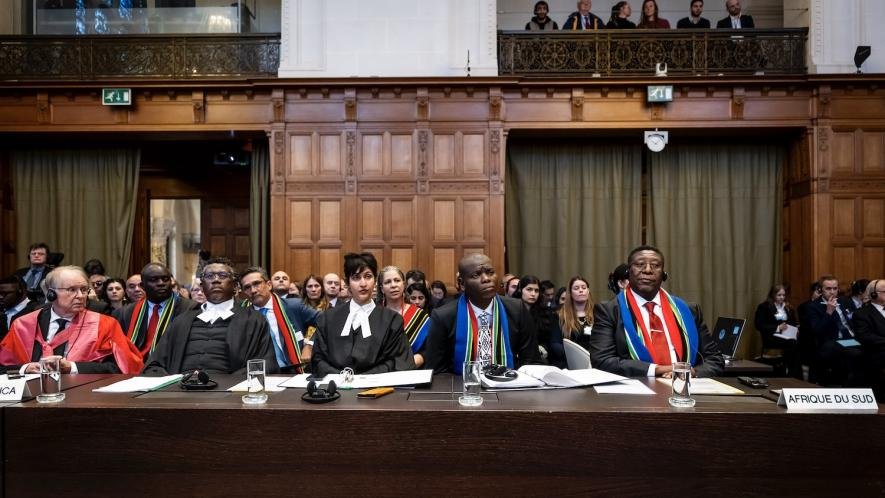Why in news?
- The International Court of Justice (ICJ) has been asked to consider whether Israel is committing genocide against the Palestinians in Gaza.
- South Africa brought the case to the court.
What’s in today’s article?
- International Court of Justice (ICJ)
- News Summary
International Court of Justice (ICJ)
- About
- The ICJ is the principal judicial organ of the United Nations (UN).
- It was established in June 1945 by the Charter of the United Nations and began work in April 1946.
- The seat of the Court is at the Peace Palace in The Hague (Netherlands).
- It is the only one of the six principal organs of the UN that is not located in New York City.
- English and French are the ICJ’s official languages.
- Background:
- ICJ is the successor to the Permanent Court of International Justice (PCIJ).
- PCIJ was brought into being by the League of Nations.
- After World War II, the League of Nations and PCIJ were replaced by the United Nations and ICJ respectively.
- The PCIJ was formally dissolved in April 1946, and its last president, Judge José Gustavo Guerrero of El Salvador, became the first president of the ICJ.
- ICJ is the successor to the Permanent Court of International Justice (PCIJ).
- Role:
- To settle, in accordance with international law, legal disputes submitted to it by States and
- To give advisory opinions on legal questions referred to it by authorized United Nations organs and specialized agencies.
- Judges
- The ICJ has 15 judges who are elected to nine-year terms by the UN General Assembly and Security Council, which vote simultaneously but separately.
- To be elected, a candidate must receive a majority of the votes in both bodies, a requirement that sometimes necessitates multiple rounds of voting.
- A third of the court is elected every three years and elections are held at the UNHQ in New York during the annual UNGA meeting.
- The judges elected at the triennial election commence their term of office on February 6 of the following year.
- The president and vice-president of the court are elected for three-year terms by secret ballot. Judges are eligible for re-election.
- Indian Judges at ICJ
- Four Indians have been members of the ICJ so far.
- Justice Dalveer Bhandari, former judge of the Supreme Court, has been serving at the ICJ since 2012.
- Members and Jurisdiction
- All members of the UN are automatically parties to the ICJ statute. However, this does not automatically give the ICJ jurisdiction over disputes involving them.
- The ICJ gets jurisdiction only if both parties consent to it.
- The judgment of the ICJ is final & technically binding on the parties to a case.
- There is no provision of appeal. It can at the most, be subject to interpretation or, upon the discovery of a new fact, revision.
- The ICJ has no way to ensure compliance of its orders, and its authority is derived from the willingness of countries to abide by them.
- All members of the UN are automatically parties to the ICJ statute. However, this does not automatically give the ICJ jurisdiction over disputes involving them.
News Summary: South Africa’s genocide case against Israel at the ICJ
- South Africa has brought a case to the ICJ accusing Israel of committing genocide in its military response to the 7 October Hamas attack that killed hundreds of Israeli civilians.
- The South African case includes references to the Israeli use of blanket bombing and the cutting of food, water and medicine supplies to Gaza.
- If ICJ passes an order, it will have legal significance for all States that are parties to the Genocide Convention
Jurisdiction of ICJ in the present case
- The ICJ cannot automatically decide all cases involving breaches of international law.
- It can only decide cases that are brought before it by States that consent to its jurisdiction.
- In the present case, the agreement comes from an article in the UN’s 1948 Genocide Convention.
- As per this article:
- Disputes about interpreting, applying, or fulfilling the Convention, including a State’s responsibility for genocide, must go to the ICJ if any party involved asks for it.
- Both South Africa and Israel are parties to the Convention.
UN’s 1948 Genocide Convention
- About
- The Convention on the Prevention and Punishment of the Crime of Genocide is an international human rights treaty that codified the crime of genocide for the first time.
- This was the first human rights treaty adopted by the UN General Assembly on December 9, 1948, and has been in effect since January 12, 1951.
- Genocide acts as per this convention
- The Convention defines genocide as five Physical acts:
- killing members of a group;
- causing serious bodily or mental harm;
- inflicting on the group, conditions of life calculated to bring about their physical destruction;
- imposing measures intended to prevent births within a group; and
- forcibly transferring children of the group to another group — committed with intent to destroy, in whole or in part, a national, ethnic, racial, or religious group.
- The Convention defines genocide as five Physical acts:
- Claim of genocide
- There are two elements: the physical element (given above) and the mental element (specific intent to destroy, in whole or in part a specific group).
- Committing these acts, however widespread, is not enough to make a claim of genocide.
- The specific intent to destroy is what distinguishes genocide from war crimes, ethnic cleansing, and crimes against humanity.
- Also, the commission of war crimes, ethnic cleansing, and crimes against humanity do not provide an avenue for States to approach the ICJ because the court does not have automatic jurisdiction over those crimes.




